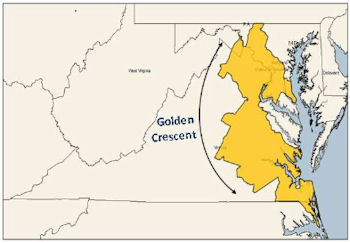In a foreshadowing of a possible grand urban alliance, Hampton Roads mayors have reached out to counterparts in Northern Virginia and the Richmond region to unite in pursuit of a comprehensive transportation funding solution.
“We all recognize the crisis Virginia faces as it relates to transportation, therefore, we strongly believe it is time for the Golden Crescent Region of Virginia to organize ourselves,” states a letter sent this week by the Hampton Roads Mayors and Chairs Caucus.
The Virginian-Pilot described the initiative as the “brainchild” of Norfolk Mayor Paul Fraim and Virginia Beach Mayor Will Sessoms. The letter had support from leaders across Hampton Roads, the newspaper reports. Among south Hampton Roads municipalities, only Chesapeake declined to sign.
The letter comes as the General Assembly prepares to return to the Capitol next week to vote on a state budget after Senate and House conferees nixed $300 million to pay down future toll rates on the Dulles Toll Road and an unspecified amount of additional toll-mitigation funds for the Midtown/Downtown Tunnel project.
A number of years ago, the letter notes, there was an attempt to get the Golden Crescent to coalesce around transportation and education issues. It is time to revive that initiative. “Considering the transportation crisis we now face, we strongly feel it is time again for us to join together, perhaps with the assistance of the business community. We believe our regions working together can effectively influence the General Assembly to address the transportation crisis.” The letter also noted the need to address tax reform and the outcome of the Supreme Court ruling on Obamacare.
The letter proposed convening a summit of the mayors and boards of supervisor chairs from Golden Crescent localities soon after the reconvened General Assembly session. “The purpose of this gathering would be to coalesce around some general ideas relating to transportation funding, developing a strategy, and discuss outreach to the business community. More specifically, we would agree to harness our respective political influence and initiate a campaign to influence our General Assembly to address our significant transportation challenges.”
The letter provides no specific remedies. But it’s not difficult to imagine what the signatories have in mind. They’re not talking about changing they way they do business. They want mo’ money. Someone else’s money.
That’s easier said than done. Here are some of the hard realities that Governor Bob McDonnell and state state confront while trying to find more money for transportation.
- Gas tax. While elites favor an increase in the motor fuels tax, the general public does not. The reasons for the gulf in sentiment are twofold: (a) Higher-income households can absorb higher prices at the pump more easily than lower/middle households can, and (b) higher-income households place a higher premium on time spent stalled in traffic congestion than do lower/middle income families. For elected Republican officials, whose middle-class suburban and rural constituents drive more than average, the gas tax is politically toxic.
- Borrowing. The McDonnell administration has already maxed out the state’s borrowing limits for transportation projects without endangering Virginia’s AAA bond rating. (See “Rail-to-Dulles and the Debt Dilemma“). Borrowing more is not an option.
- General Fund. The General Assembly has just nixed two proposals to divert monies from the General Fund to the Transportation Trust Fund. Democrats, who led the charge for higher gas taxes, also led the charge to defeat proposals that would siphon off monies otherwise reserved for schools, colleges, health care, prisons and other non-transportation priorities.
- Tolls. The McDonnell administration is aggressively pursuing public-private partnerships that would finance mega-projects by means of tolls. But the Hampton Roads mayors have made it very clear that they don’t like the idea of making their constituents pay the full cost of what it takes to build those projects. So, while tolls remain an option, it’s not one that the letter signatories like.
There are alternatives to spending mo’ money. For the benefit of new readers, or those readers who failed to absorb the wisdom imparted by my previous columns, let me review some of them.
- Zoning reform. Reform antiquated zoning codes and comprehensive plans that lock suburban growth counties into “suburban sprawl” mode — a development pattern marked by segregated land uses, low density and autocentric design — and make it easier for developers to build compact, walkable, mixed use communities when supported by consumer demand.
- Prioritize by ROI. Prioritize transportation projects that deliver the greatest social Return on Investment as measured by safety, congestion relief, economic development (attracting primary employers, not retail and service employers) and environmental impact.
- Devolution. Align transportation and land use by devolving responsibility of secondary roads, along with the means to pay for them, to local governments. If local mayors and chairs make poor decisions, they should pay for them — not the state.
- User pays. Restructure transportation financing to a “user pays” system — gas tax and tolls are the most practical means at the moment — in which those who benefit from transportation projects are the ones who pay for them. When users pay for transportation improvements, they are more discriminating about what they ask for.
- Deregulate transit. Revitalize shared ridership by shifting away from the failed model of government-owned transit monopolies to a model based on competition, private ownership and innovation.
- Technological innovation. Pursue new technologies that drive down the cost of building and maintaining roads. Two examples: the use of LiDAR technology to achieve breakthrough gains in surveying and design efficiency, and the use of cold in-place recycling of asphalt in repaving projects.
Will any of these alternatives to Mo’ Money be on the agenda of the Golden Crescent summit? I would be flabbergasted if they were.



